

Harnessing Technology to Revolutionize Behavioral and Mental Health Care. There is currently tremendous innovation happening in the behavioral and mental health care space with many digital health startups and initiatives using technology to try to address one of society’s most pressing issues.
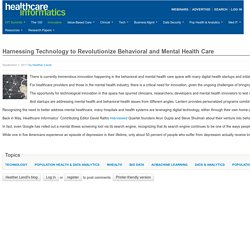
For healthcare providers and those in the mental health industry, there is a critical need for innovation, given the ongoing challenges of bringing behavioral and mental health into the care continuum. According to data from the National Institute of Mental Health (NIMH), one in five Americans have a diagnosable mental disorder, or roughly 43 million people. And, nearly 10 million Americans have serious functional impairment due to a mental illness, such as a psychotic or serious mood or anxiety disorder. What’s more, NIMH also estimates that serious mental illness costs America $193 billion in lost earnings per year. Should Mental Health App Developers Back Up Their Claims With Clinical Evidence? Millions of people with mental health disorders, including depression and bipolar disorder, are not getting the help they need.
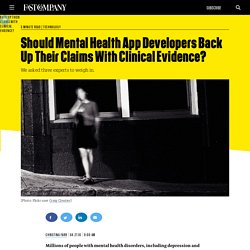
Mental health: There’s an app for that. Illustration by Oliver Munday Type 'depression' into the Apple App Store and a list of at least a hundred programs will pop up on the screen.
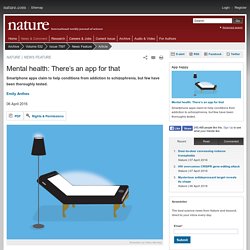
Depression. New project monitors social media for signs of mental illness - Trending. Every minute of every day, approximately 347,000 tweets, 293,000 Facebook statuses and 400 hours worth of YouTube videos are uploaded to the web — along with astronomical amounts of information about social media users' lives and habits.
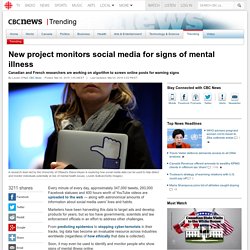
Marketers have been harvesting this data to target ads and develop products for years, but so too have governments, scientists and law enforcement officials in an effort to address other challenges. From predicting epidemics to stopping cyber-terrorists in their tracks, big data has become an invaluable resource across industries worldwide (regardless of how ethically that data is collected). Soon, it may even be used to identify and monitor people who show signs of mental illness online.
On Tuesday, Minister of Science Kirsty Duncan announced more than $48 million in federal funding for 76 research teams across Canada through the Natural Sciences and Engineering Council of Canada's (NSERC) Strategic Partnership Grants. Mental Health – Adult Outpatient Program. Mental Health Apps—They Help but We Don't Know How Much. Computers and mental healthcare already have a history together; psychiatric researchers jumped on the opportunity for automated therapy treatments during the late ’90s as personal computers became more ubiquitous.
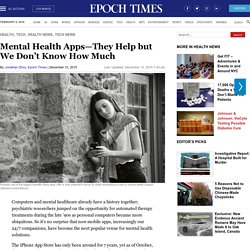
So it’s no surprise that now mobile apps, increasingly our 24/7 companions, have become the next popular venue for mental health solutions. The iPhone App Store has only been around for 7 years, yet as of October, there were at least 1,526 depression-related apps alone, and scores of other apps have been created to treat or monitor virtually every disorder out there. There are games to help conquer negative thoughts, and mental exercises to manage stress and anxiety. Some geo-track substance abusers and tabulate their visits to risk areas like town bars. Others help you measure mood patterns then let you share results with a social media support community.
There are apps for dementia, autism, panic, bulimia, obsessive-compulsive disorder, and PTSD, to name a few. On the Horizon. Where are all the mental health apps? © Time Inc.
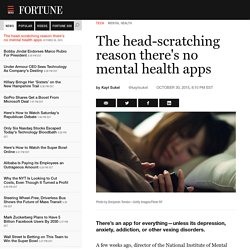
All rights reserved. Fortune.com is a part of the Time.com network of sites. Powered by WordPress.com VIP Email address or Password is incorrect Forgot Password? Want the Full Story? Privacy Policy Thank you for your interest in licensing Fortune content. 1. X. Smartwatch among winners at Hacking Health. TORONTO – A Smartwatch app designed to help people recover from depression and connect them with their care circle received the Innovative Solution Award from the Ontario Telemedicine Network (OTN) at the wrap-up for the Hacking Health Design Challenge.
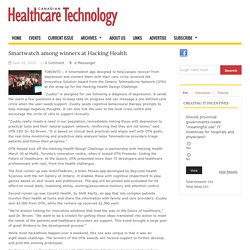
“Zuubly” is designed for use following a diagnosis of depression. It sends the users a few questions a day to keep tabs on progress and can message a pre-defined care circle when the user needs support. Zuubly sends cognitive behavioural therapy prompts to help manage negative thoughts. It can also link the user to the local crisis centre and encourage the circle of care to support recovery. “Zuubly really meets a need in our population, immediately linking those with depression to practical tools and their natural support network, reinforcing that they are not alone,” said OTN CEO Dr.
The first runner-up was ArtonTheBrain, a brain fitness app developed by Baycrest Health Sciences with the Art Gallery of Ontario. Dr. Lawson, Telus, Infoway partner on app for mental health. Mobile solutions.
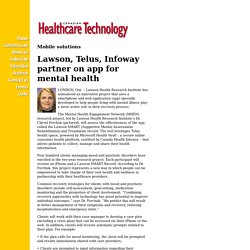
How effective are mental health apps? MHCC E Mental Health Briefing Document ENG. Health tools. Top 10 Mental Health Apps. With so many apps on the market, it’s hard to know which are useful.
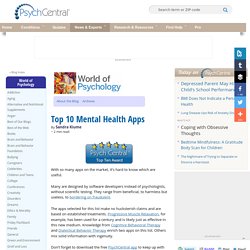
Many are designed by software developers instead of psychologists, without scientific testing. They range from beneficial, to harmless but useless, to bordering on fraudulent. The apps selected for this list make no hucksterish claims and are based on established treatments. Progressive Muscle Relaxation, for example, has been used for a century and is likely just as effective in this new medium.